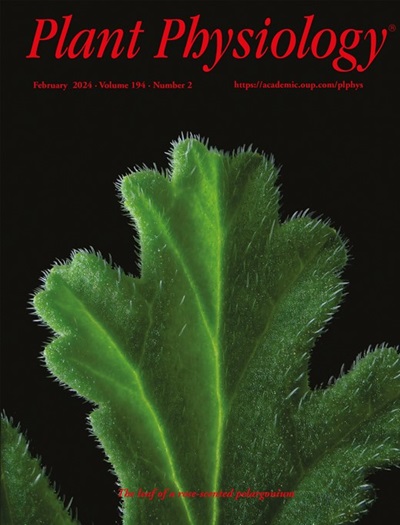CYP81D11是一种对类胡萝卜素敏感的细胞色素P450,它能增强植物的光合作用和抗逆性
IF 6.9
1区 生物学
Q1 PLANT SCIENCES
引用次数: 0
摘要
β-环柠檬酸及其前体β-环柠檬醛是一种信号转导类胡萝卜素,可触发防御和解毒机制,增强植物对非生物胁迫的耐受性。通过对拟南芥(Arabidopsis thaliana)植物多次暴露于每种拟南芥类胡萝卜素的转录组学分析,我们发现了一个编码细胞色素P450的基因(CYP81D11),该基因在所有条件下都被强烈诱导,并受到TGAII-SCL14转录调节因子的控制。在拟南芥中,CYP81D11基因的过表达导致了对强光和水分胁迫的高耐受性,而CYP81D11缺陷突变体对这两种胁迫条件都敏感。CYP81D11表达水平与叶片中活性羰基化脂质氧化产物的积累呈负相关。CYP81D11过表达基因的转录组学分析显示,该基因选择性上调了与光合作用和对强光胁迫的反应相关的基因。CYP81D11的高表达水平增强了光合电子传递、二氧化碳固定和生物量生产。这些效应发生在强光下,而不是在弱光下,并且与单线态氧光产生的显著减少有关。这些结果表明,CYP81D11是调控植物抗逆性、增强叶片光合能力和防止活性羰基积累的关键成分。这种基因可能是在强光环境下改善光合作用的目标。本文章由计算机程序翻译,如有差异,请以英文原文为准。
CYP81D11, an apocarotenoid-responsive cytochrome P450, enhances photosynthesis and stress tolerance in plants
β-cyclocitric acid and its precursor β-cyclocitral are signaling apocarotenoids that trigger defense and detoxification mechanisms enhancing plant tolerance to abiotic stresses. From a transcriptomic analysis of Arabidopsis (Arabidopsis thaliana) plants exposed to each apocarotenoid over several exposure times, we identified a gene (CYP81D11) encoding a cytochrome P450 that is strongly induced under all conditions and is under the control of the TGAII-SCL14 transcription regulator. Overexpressing the CYP81D11 gene in Arabidopsis led to a high tolerance to high light and water stresses while a CYP81D11-deficient mutant was sensitive to both stress conditions. CYP81D11 expression levels were inversely correlated with the accumulation of reactive carbonylated lipid-oxidation products in leaves. The transcriptomic profile of the CYP81D11 overexpressor revealed a selective upregulation of genes related to photosynthesis and response to high light stress. High expression levels of CYP81D11 enhanced photosynthetic electron transport, CO2 fixation and biomass production. These effects occurred in high light, not in low light, and were associated with a noticeable decrease in singlet oxygen photoproduction. These findings indicate that CYP81D11 is a key component in the regulation of plant stress tolerance, enhancing the photosynthetic capacity of leaves and preventing accumulation of reactive carbonyls. This gene could be a target for improving photosynthesis in high-light environments.
求助全文
通过发布文献求助,成功后即可免费获取论文全文。
去求助
来源期刊

Plant Physiology
生物-植物科学
CiteScore
12.20
自引率
5.40%
发文量
535
审稿时长
2.3 months
期刊介绍:
Plant Physiology® is a distinguished and highly respected journal with a rich history dating back to its establishment in 1926. It stands as a leading international publication in the field of plant biology, covering a comprehensive range of topics from the molecular and structural aspects of plant life to systems biology and ecophysiology. Recognized as the most highly cited journal in plant sciences, Plant Physiology® is a testament to its commitment to excellence and the dissemination of groundbreaking research.
As the official publication of the American Society of Plant Biologists, Plant Physiology® upholds rigorous peer-review standards, ensuring that the scientific community receives the highest quality research. The journal releases 12 issues annually, providing a steady stream of new findings and insights to its readership.
 求助内容:
求助内容: 应助结果提醒方式:
应助结果提醒方式:


